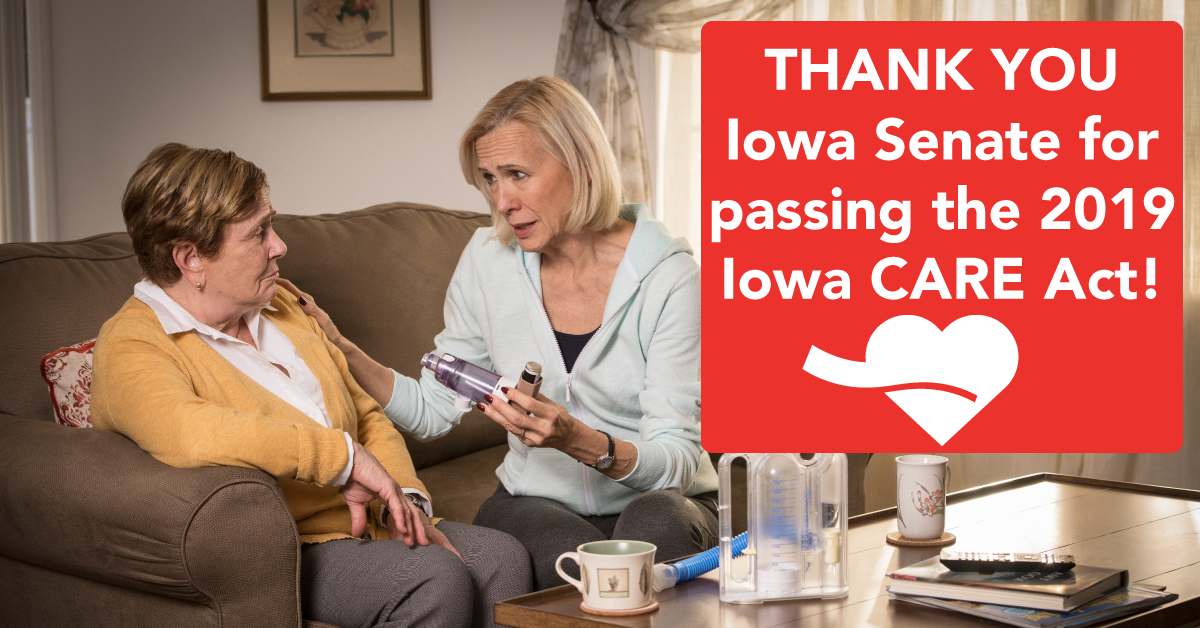AARP Hearing Center

The Iowa Senate unanimously passed the 2019 Iowa CARE Act (SF 210) today by a vote of 49-0. The CARE (Caregiver Advise, Record and Enable) Act outlines commonsense steps to help Iowa’s more than 317,000 family caregivers when their loved one goes into the hospital and as they transition home.
Sponsored by Sen. Mark Segebart (R) of Vail, SF 210 features four important provisions: the name of the family caregiver is recorded when their loved one is admitted into a hospital, if a patient chooses to designate one; the designated family caregiver is notified when their loved one is to be discharged back home; the hospital discusses the caregivers’ abilities and limitations; finally, the hospital discusses the patient’s care needs at home and provides an explanation of the medical tasks to be performed – such as medication management, injections and wound care.
“Thank you to the Iowa Senate for passing the CARE Act and bringing needed supports to Iowa’s family caregivers, the unsung heroes who provide the majority of long-term care across the state,” said AARP Iowa State Director Brad Anderson. “We are especially grateful to Senators Segebart, Miller-Meeks, Johnson, and Ragan for their leadership and work to pass the CARE Act legislation.”
The bill now moves to the Iowa House where a companion CARE Act bill (HF 533) has already passed the House Human Resource Committee, making the bill eligible for House floor debate.
The 2019 Iowa CARE Act currently has no registered opposition, and is supported by more than a dozen organizations across the state, including AARP Iowa, Alzheimer’s Association: Greater Iowa Chapter, American Cancer Society Cancer Action Network Iowa, American Heart Association of Iowa, Association of Area Agencies on Aging, National Multiple Sclerosis Society, and the Older Iowans Legislature.
With North Dakota passing their CARE Act on March 20 of this year, Iowa is one of only 12 states that do not have a law similar to the CARE Act in place for caregiving families. No federal laws, rules or regulations—including those for Medicare—define the steps hospitals must take so family caregivers are engaged in their loved ones’ care.
In late 2018, AARP released the results of a statewide caregiving survey of 800 registered voters age 40+ across Iowa, showing that more than 95 percent of current family caregivers in Iowa believe it is ‘extremely’ or ‘very’ important that they receive instruction on medical tasks they need to provide for their loved one at home upon being discharged from the hospital.
The survey results also showed that Iowans are overwhelmingly in support of the three main measures in the Iowa CARE Act. In response to questions about their support or opposition, the survey showed that 92% of respondents support requiring hospitals to explain and demonstrate medical tasks to caregivers; 91% support requiring hospitals to keep caregivers informed of major decisions, like transferring or discharging the patient; and 83% support requiring hospitals to give the patient the option to record the name of a caregiver in the medical records upon admission.
Across Iowa, family caregivers spend 295 million hours each year caring for loved ones—a contribution totaling about $3.8 billion in unpaid care. They carry out tasks like managing finances, providing transportation, helping with bathing and dressing, cooking meals and more.
More information on the 2019 Iowa CARE Act can be found at www.aarp.org/IACareAct2019.































































